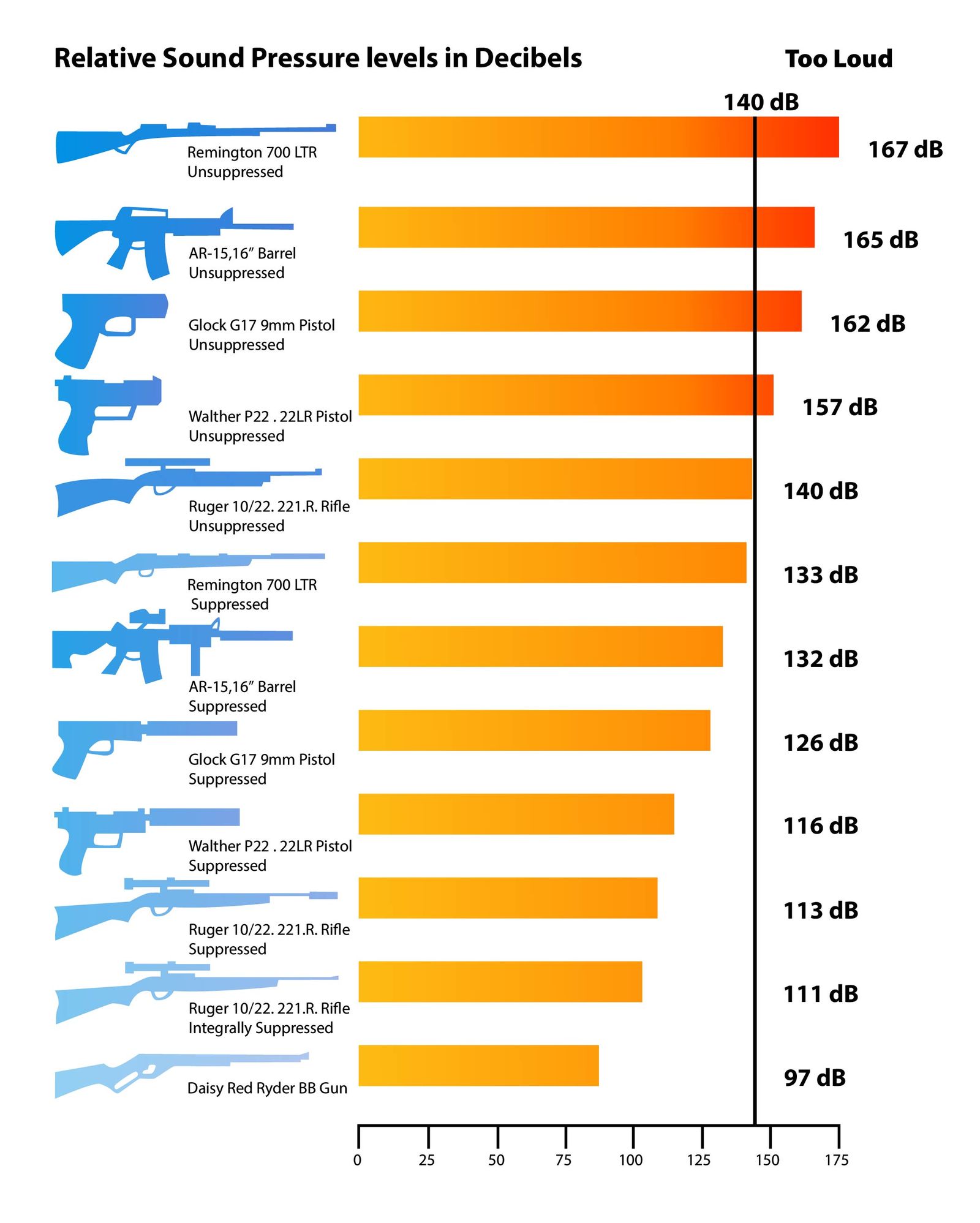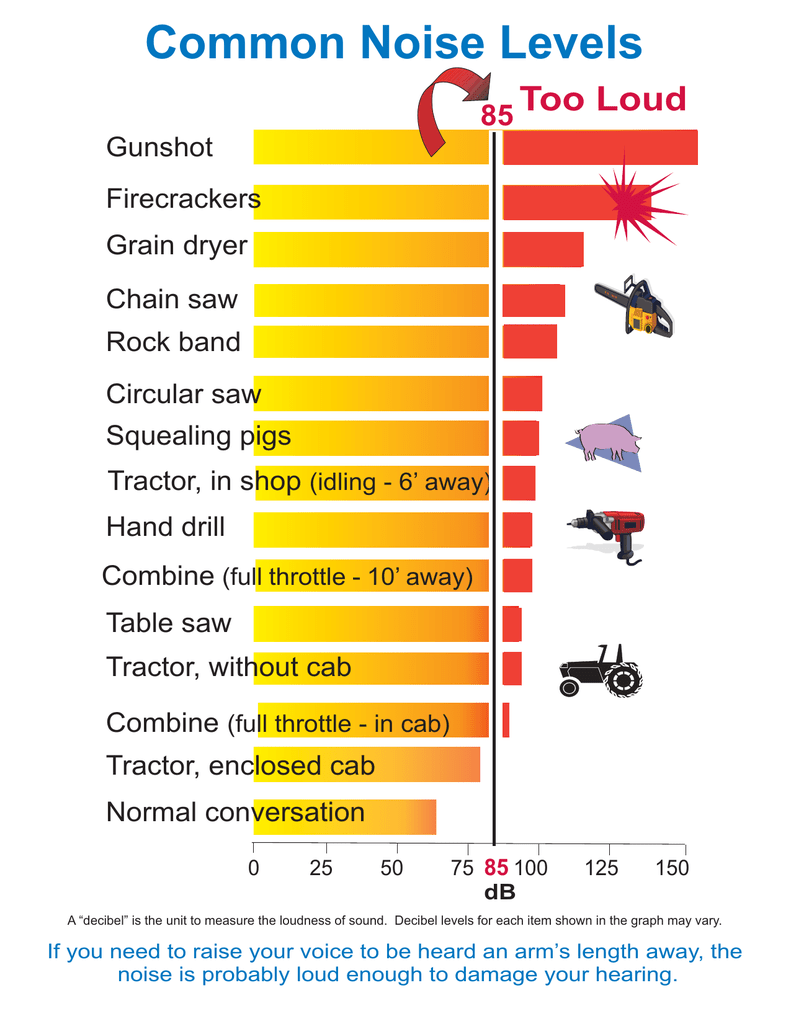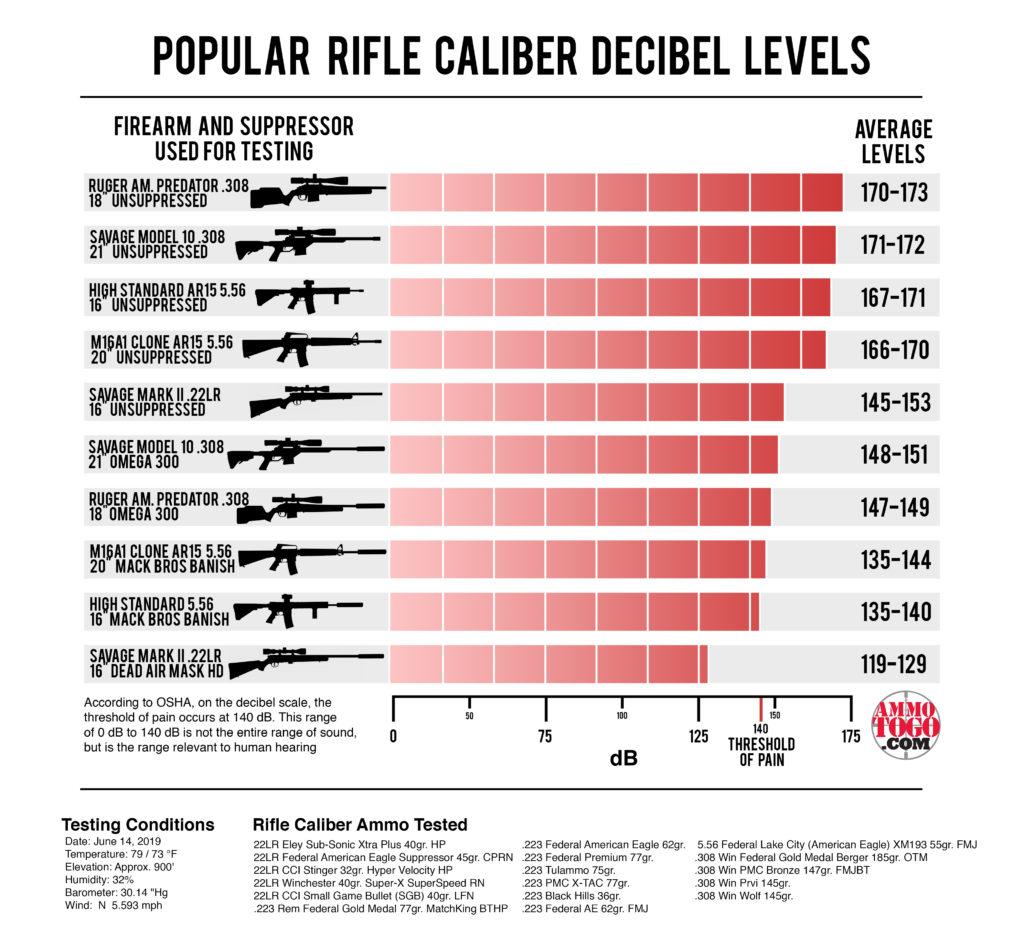
The Loudest Sound in a Gun Fight YouTube
A gunshot's noise is typically measured in decibels (dB), a unit that quantifies the intensity of sound. On average, gunshots have decibel levels ranging from 140 to 170 dB, depending on the firearm used. For comparison, this is significantly louder than a typical conversation (about 60 dB) and even surpasses the threshold for pain, which is.

How Loud is a Gunshot? Gun DB Levels Compared Silencer Central
All it takes is a single blast. While most noise-induced hearing loss results from continuous exposure to loud sounds, even a single gunshot blast can cause permanent damage. Terry said everyone within earshot of gunfire should make it a habit to wear hearing protection. "A single blast can cause lasting hearing loss and tinnitus ," she said.

How Loud Is A Gunshot
A gunshot can travel a very long distance. The distance of hearing the shot is dependent on the weapon and weather. Ambient Sound is transmitted better at low levels. A gunshot is one of the loudest sounds you can hear. Depending on the environment, it can be heard from up to a mile away. This makes gunshots a perfect way to communicate with.

How Many Decibels Is A Gunshot How Far Away Can You Hear a Gunshot
The tone of a gunshot ranges from high-pitched pistols, which sound like a popping balloon, to larger caliber rifles that have a more boomy sound like thunder. Gunshots also produce concussive muzzle blasts that hit your sinuses and chest akin to the loud bass from a subwoofer. To top it off, if supersonic ammunition is being fired, expect the.

How Loud is a Gunshot? Gun DB Levels Compared Silencer Central
Spectral analysis was also conducted on each of the firearm noise. Most of the weapons were measured to have the maximum sound level occur between 500 and 800 Hz. The graph below displays the results of this analysis. The horizontal lines in the chart represent 10 decibel intervals; the dark bar at the center of each spectrum is the 1000 Hz band.

How loud is a rifle down range when silenced? YouTube
A gunshot can range anywhere from 140 to 190 decibels, which is significantly louder than most everyday sounds, including live concerts, chainsaws, or even jets. General noise levels below 70 dB are usually safe, but prolonged exposure to noises above 85 dB can lead to gradual hearing loss. Gunshots are often twice as loud, posing a significant.
How Loud Is A Gunshot? Let's Compare Different Guns And Find Out ISOtunes Sport
A sound 1,000 times more powerful would be 30 dB. To put it into perspective, a jet engine is about 1,000,000,000,000 times more powerful than near silence. Remarkably, gunfire registers at a higher decibel level than a jet engine. A jet engine registers at 140 dB while a 9mm pistol registers in at 160 dB.

Gunshot and Loud Noise Anomaly Detection Bosch Intelligent Video Analytics (IVA)
How Loud Is a Gunshot Without Hearing Protection? A good rule of thumb is that no gun is safe without hearing protection. Even the smallest gun is 140 dB without a suppressor or other accessories. Therefore, you should always wear hearing protection. Many people will not experience pain with a small .22 rifle but these guns can still cause.

Common Noise Levels
How loud is the sound of a gun when it's fired underwater? The sound of a gunshot is actually much quieter when fired underwater. Is it possible to muffle the sound of a gunshot? Using a suppressor can reduce the sound of a gunshot, but it still remains loud.

How loud is a gunshot? Noise Monitoring Services
4. Are all gunshots equally loud? No, the volume of a gunshot depends on several factors such as the type of firearm, ammunition, muzzle velocity, and distance from the source. 5. What is considered a safe distance from a gunshot? To avoid potential hearing damage, it is generally recommended to be at least 500 feet away from a gunshot. 6.

How Loud is a Gunshot? Gun DB Levels Compared Silencer Central
As an example of how loud a gunshot can be, a .22 caliber rifle with standard velocity ammo creates 140 dB of sound. That's loud enough to cause permanent hearing damage and physical pain. More powerful centerfire ammo is even louder. Sound is measured in decibels (Db) on a logarithmic scale. Sounds 10 times louder than total silence would be.

(PDF) On acoustic gunshot localization systems
Firearms can be extremely loud, with noise levels reaching up to 165 decibels, which is more than enough to cause permanent hearing damage with just one shot. Contents How loud is a gunshot? A gunshot can reach noise levels of up to 165 decibels, which is louder than a jet engine taking off.

Loud Noise Anomaly Detection (Gunshot Detection) with Audio Analytics in a Bosch Security Camera
The decibels of a gunshot exceed 85 dB. Additionally, the threshold of pain is 130 dB and, as we've seen, gunshots from most firearms exceed this noise level too. Therefore, the answer to `Can gunshot noise damage your hearing` is yes. A loud enough gunshot can damage your hearing. It can even cause immediate hearing loss.

Gun decibel chart stormuse
How Loud are Guns? Any sound above 85 dB is potentially dangerous for hearing. Anything above 140 dB can cause immediate, permanent hearing loss. So, how loud is a gun? It all depends on the gun type and the caliber, but all guns are louder than the Centers for Disease Control's (CDC) safe hearing levels.

Silencer Guide with Decibel Level Testing
Just how loud is a gunshot? Let's take a look at some comparisons and popular shooting calibers to understand shooting sound levels. The average adult tends to experience pain and discomfort at a level of sound around 120 dB. Pain is a relative figure and obviously varies by person, but medical experts agree noise around that level is unhealthy.

What Does A Gunshot Sound Like?
In logarithmic scales a sound which is only 3 db higher than another, has twice the energy. For example, if you look at the table below, the 9mm Para cartridge at 160 db has twice the sound energy of the .45 ACP cartridge which is measured at 157 db. Another complication is that the human ear does not hear linearly either.
- The Smiths Back To The Old House Lyrics
- One Direction Lyrics Drag Me Down
- Chronology Of Prophets In Islam
- Just Go With It Eyebrows
- How Does The Internet Change Copyrights Infringement
- Steve Harvey Act Like A Lady Think Like A Man
- Cast Of Mast Mein Rehne Ka 2023
- Is Seventh Day Adventist Cult
- Saas Bahu Aur Flamingo Watch Online
- Five Letter Word Starting With S U